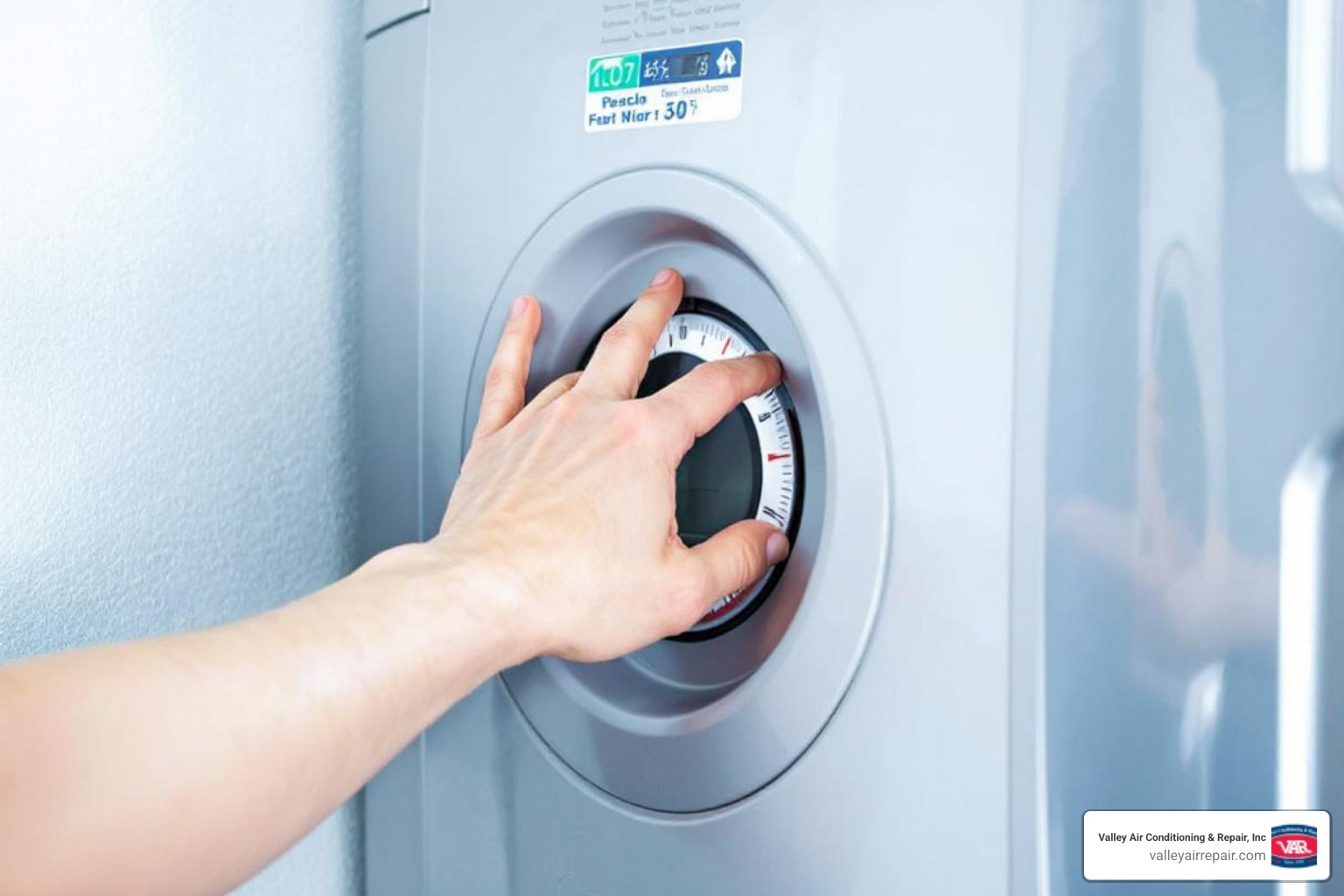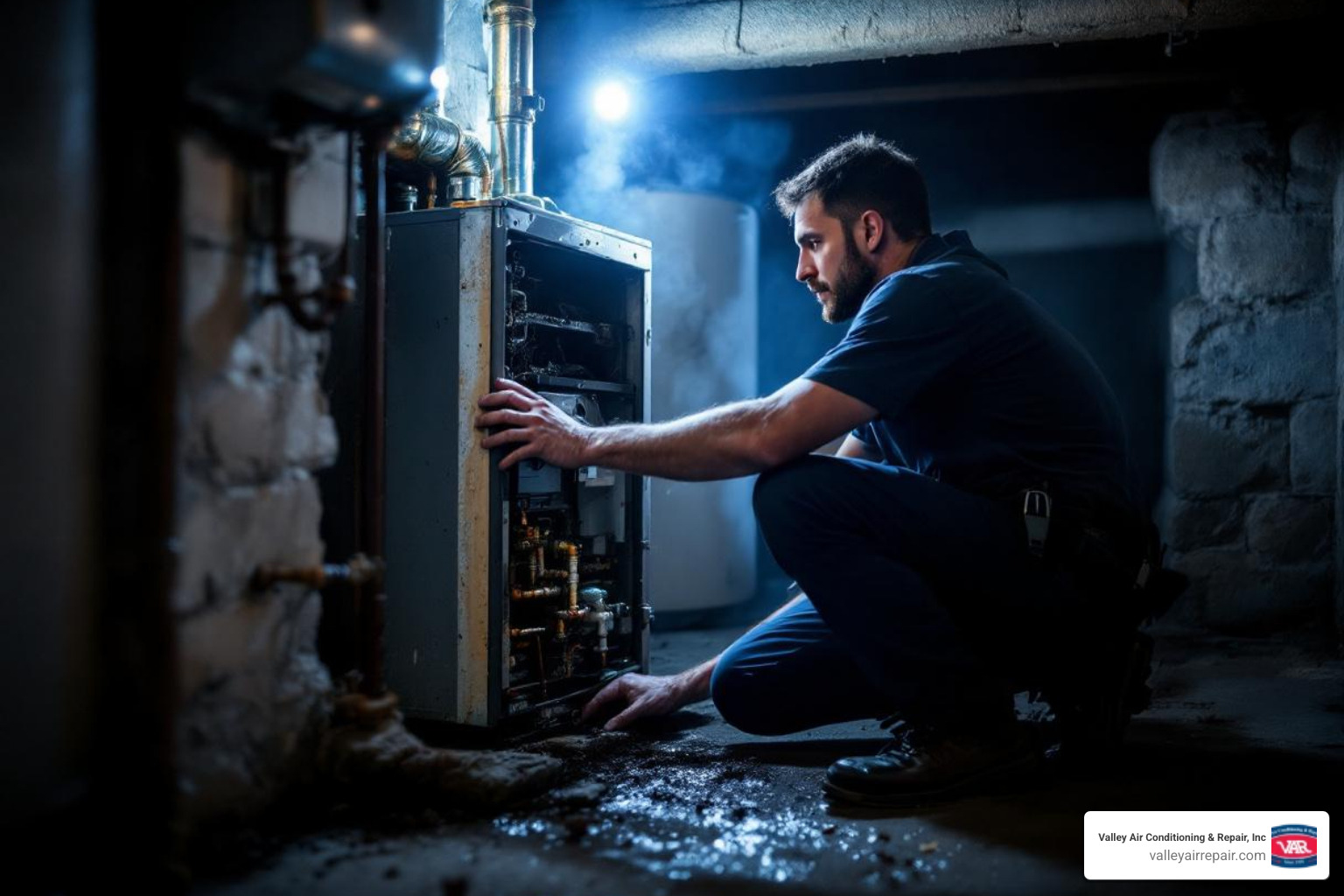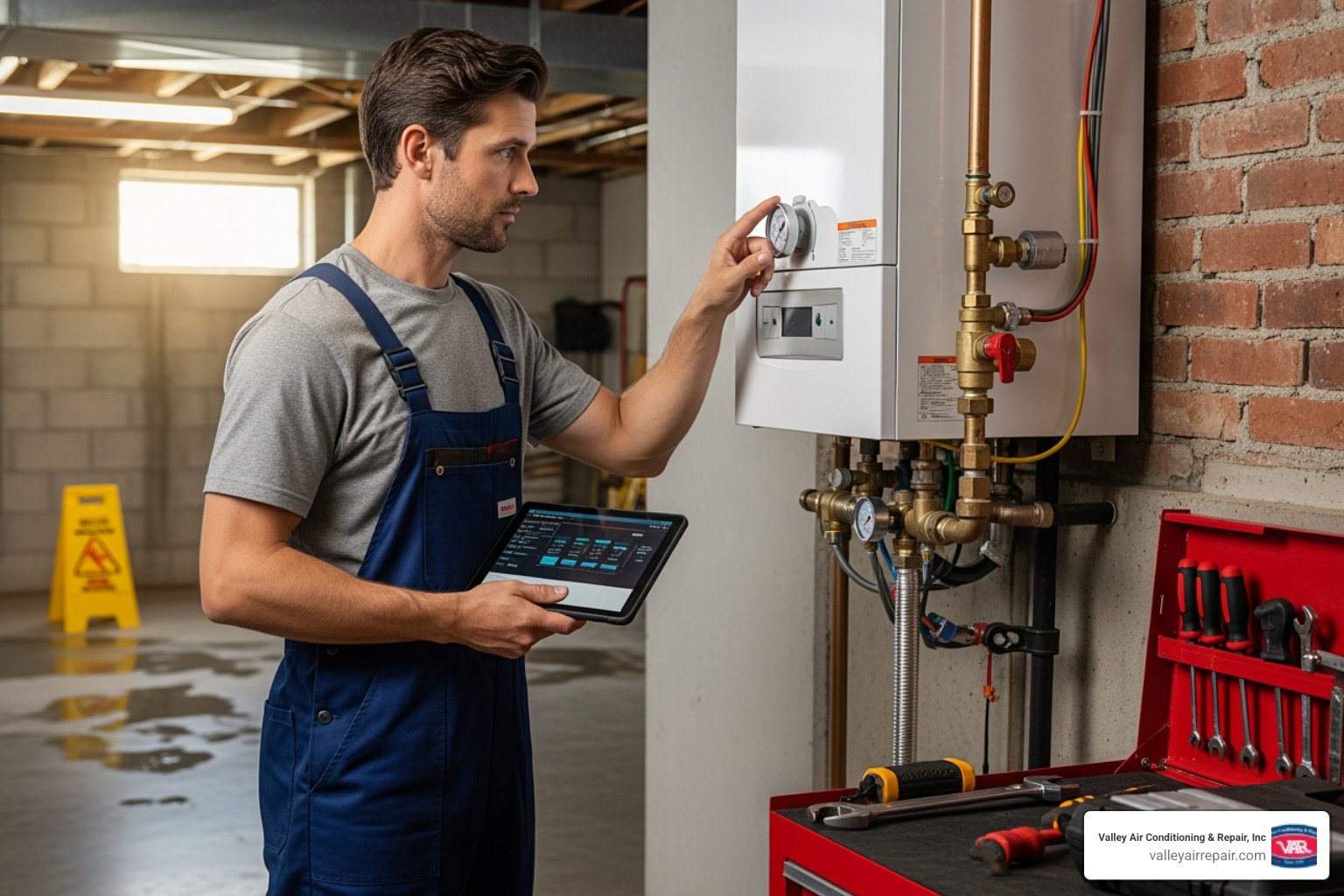Wiring Woes and Water Flows: Solving Your HVAC Headaches
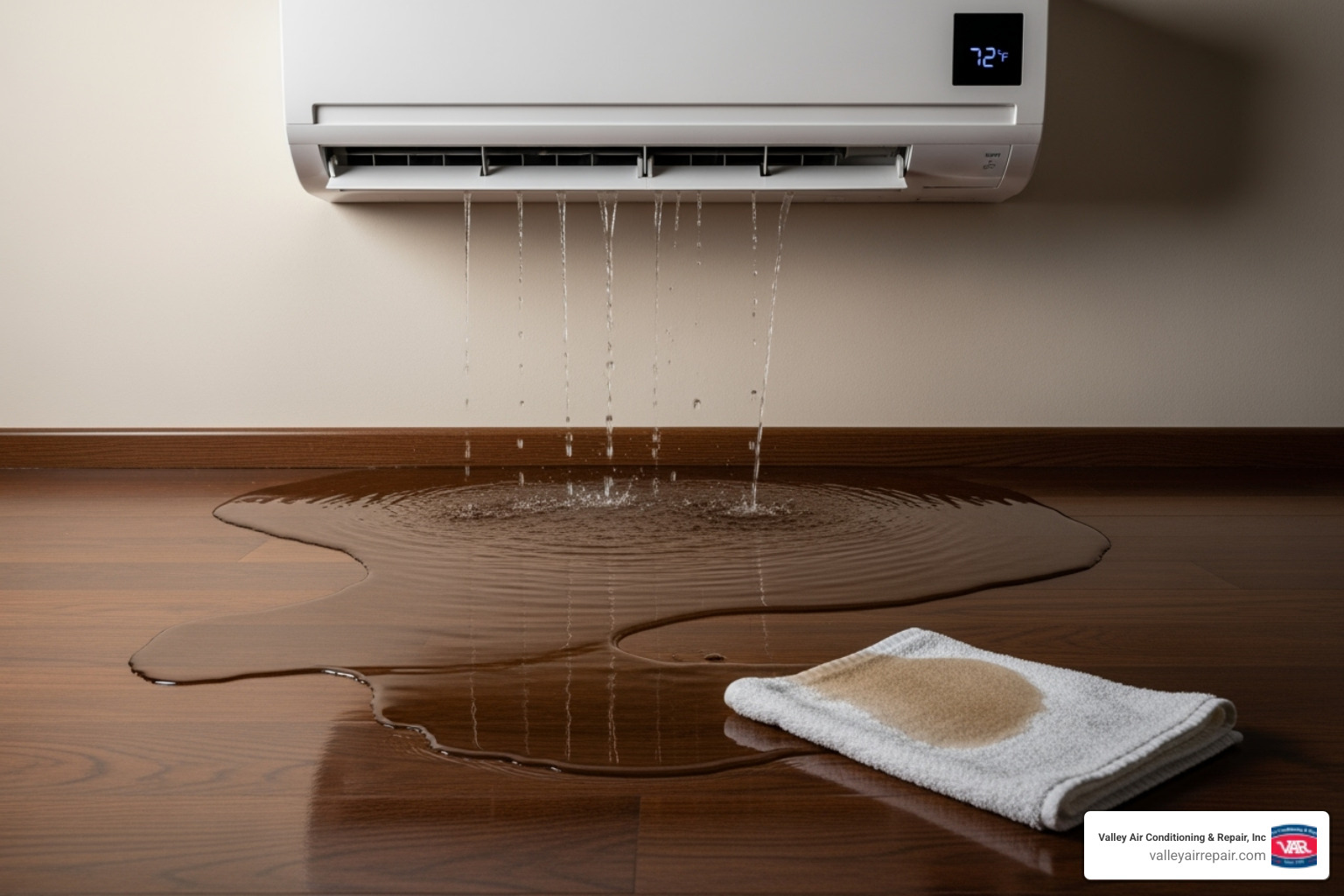
When Your AC Creates Unwanted Indoor Water Features
Air conditioner leaks can turn your comfortable home into a stressful situation faster than you might expect. Whether it's a small puddle forming around your indoor unit or water dripping from your ceiling, these leaks demand immediate attention to prevent costly damage and health hazards.
Quick Answer for Air Conditioner Leaks:
- Turn off your AC immediately - This prevents further damage and electrical hazards
- Identify the leak type - Water leaks vs. refrigerant leaks require different approaches
- Check these common causes:
- Clogged condensate drain line (most common)
- Dirty air filter causing frozen coils
- Damaged drain pan
- Broken condensate pump
- Try basic troubleshooting - Replace filters, clear drain lines with wet/dry vac
- Call a professional - For refrigerant leaks, electrical issues, or persistent problems
As one homeowner finded in our research: "Water continually dripping inside your house can become a big problem, soaking through walls and ceilings, ruining carpets and wood floors." This scenario highlights why prompt action matters.
The reality is simple: Your air conditioner naturally produces condensation as it cools your home. When this water doesn't drain properly, it finds other places to go - usually places you don't want it. While some causes have straightforward fixes, others require professional expertise to prevent recurring issues and protect your home's value.
Understanding the difference between a minor maintenance issue and a serious system problem can save you hundreds of dollars in water damage repairs and keep your family comfortable during those hot Valley summers.
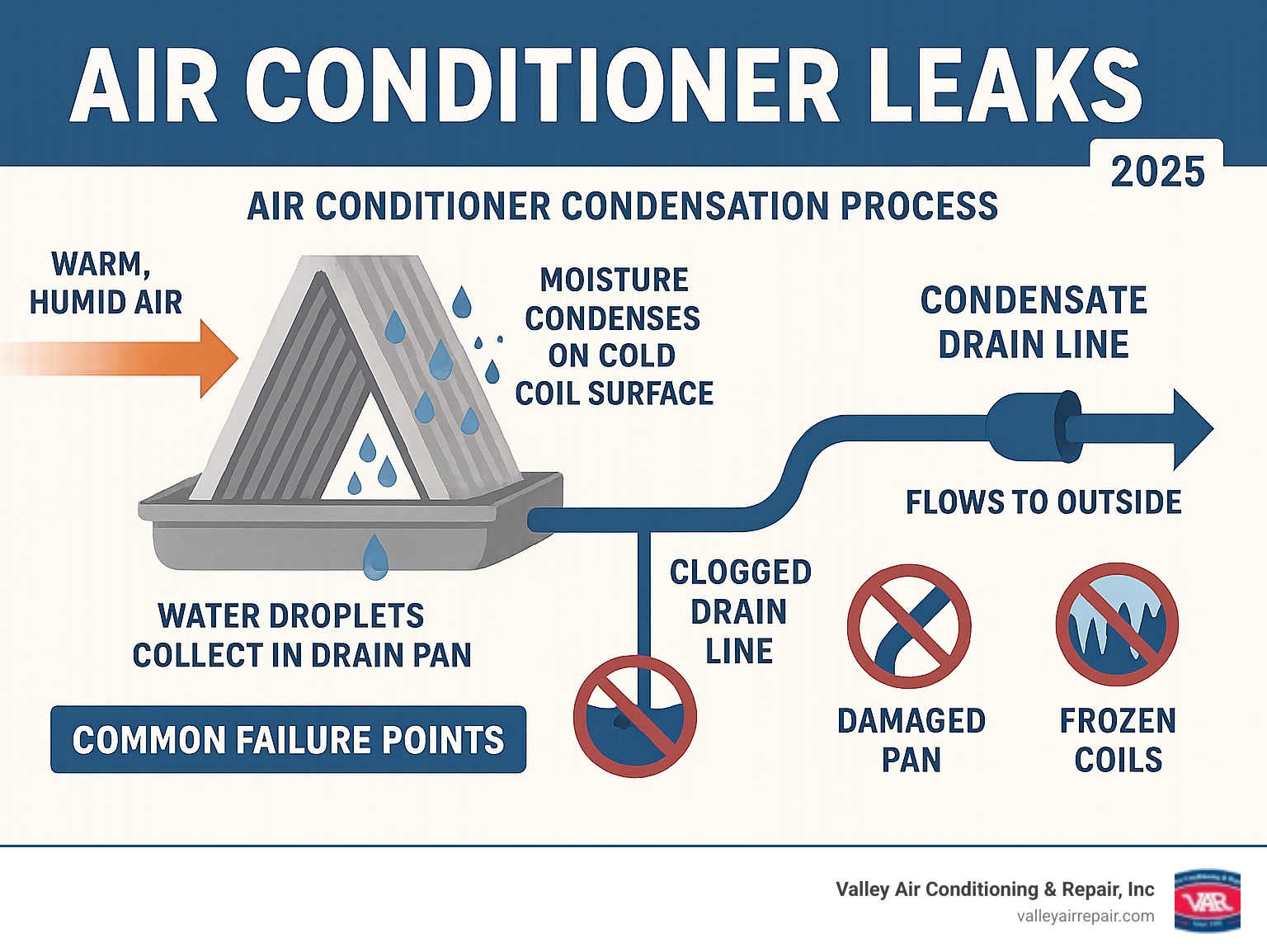
Is It Water or Refrigerant? Identifying Your AC Leak
When you find liquid coming from your air conditioner, your first instinct might be to grab a bucket and worry about it later. But here's the thing – not all AC leaks are created equal. Figuring out whether you're dealing with water or refrigerant makes all the difference between a manageable fix and a serious safety concern.
Let's start with the basics. Your air conditioner naturally creates water as it cools your home. Just like how a cold drink "sweats" on a hot day, your AC's evaporator coil collects moisture from the air. This condensation should flow neatly into a drain pan and exit through a drain line. When something interrupts this process, you get air conditioner leaks of the watery variety.
Refrigerant leaks are a completely different beast. Refrigerant is the chemical that actually does the cooling in your system, cycling through a sealed network of coils and lines. When that sealed system develops a crack or hole, the refrigerant escapes – and that's when you have a real problem on your hands.
FeatureWater LeakRefrigerant LeakSubstanceClear, odorless liquidOily residue, potentially with a strange odorSmellMusty or no smell (if clean water)Sweet, chemical, or sickly sweet odorLocationAround indoor unit, drain pan, ceiling, wallsNear coils, line sets, service valves, connectionsAC PerformanceOften still cools, but may struggleReduced cooling, warm air blowing, system struggles to reach set temperature
Water leak symptoms are usually pretty obvious once you know what to look for. You'll see actual puddles forming around your indoor unit, and you might notice water stains creeping across your walls or ceiling. Sometimes the first clue is that your home feels more humid than usual, or you catch a whiff of that musty smell that signals mold might be starting to party in places you can't see.
Refrigerant leak symptoms require a bit more detective work. Listen for hissing sounds – that's often refrigerant making its escape. You might spot an oily residue around the refrigerant lines or coils, which is definitely not something you'd see with a simple water leak.
But here's where refrigerant leaks really show their true colors: poor cooling performance. Your AC might run constantly without ever reaching the temperature you set. It could blow warm air even when it's working overtime. You might even see ice forming on your evaporator coil during the hottest part of summer, which seems backwards but actually indicates the coil is getting too cold due to low refrigerant levels.
If you suspect a refrigerant leak, please don't try to handle it yourself. Refrigerant isn't just bad for your cooling – it's genuinely hazardous to breathe and harmful to the environment. That's exactly the kind of situation where you want experienced professionals with the right tools and training to step in safely.
More info about AC repair services in Clovis
The Most Common Causes of Air Conditioner Leaks
Now that we've identified what type of leak you're dealing with, let's explore why your air conditioner leaks happen in the first place. Understanding these causes helps you tackle the problem at its source – and maybe even prevent it from happening again.
Your air conditioner is essentially a moisture-removal machine. Every time it cools your home, it pulls humidity from the air, just like how a cold drink "sweats" on a hot day. This condensation needs somewhere to go, and when that drainage system gets disrupted, you end up with water where it doesn't belong.
The good news? Most air conditioner leaks stem from a handful of common issues. We've seen these same problems countless times over our decades in the Valley, and many have straightforward solutions. The clogged condensate drain line tops our list as the most frequent culprit, followed closely by frozen evaporator coils (often caused by dirty air filters), damaged drain pans, broken condensate pumps, and improper installation issues.
Let's explore the details of these troublemakers so you can spot them before they turn your living room into an indoor swimming pool.
How a Clogged Condensate Drain Line Causes Air Conditioner Leaks
If we had a dollar for every clogged drain line we've cleared over the years, we'd probably own half the Valley by now! This little pipe – usually made of PVC or copper – carries all that condensation away from your home. It's like your AC's personal plumbing system.
Here's where things get messy: your condensate drain line becomes a perfect breeding ground for algae growth, dirt, and debris. Think about it – you've got a dark, moist environment with organic matter floating through. It's basically a five-star resort for slimy buildup.
As this gunk accumulates, it creates a blockage that stops water from flowing freely. The condensation backs up, filling your drain pan until it has nowhere to go but over the sides. That overflowing drain pan is what creates those frustrating puddles around your indoor unit or those alarming drips from your ceiling.
The water backup doesn't happen overnight – it's usually a gradual process. You might notice your AC running longer than usual or detect a musty smell before you actually see water. By the time you spot the leak, the blockage has likely been building for weeks or even months.
How to clean a clogged AC drain line
More info about AC repair services in Madera
The Role of Dirty Air Filters and Frozen Coils
This one surprises a lot of homeowners: you've got ice forming on your AC coils in the middle of July! It seems backwards, but it's actually one of the most common causes of air conditioner leaks we encounter.
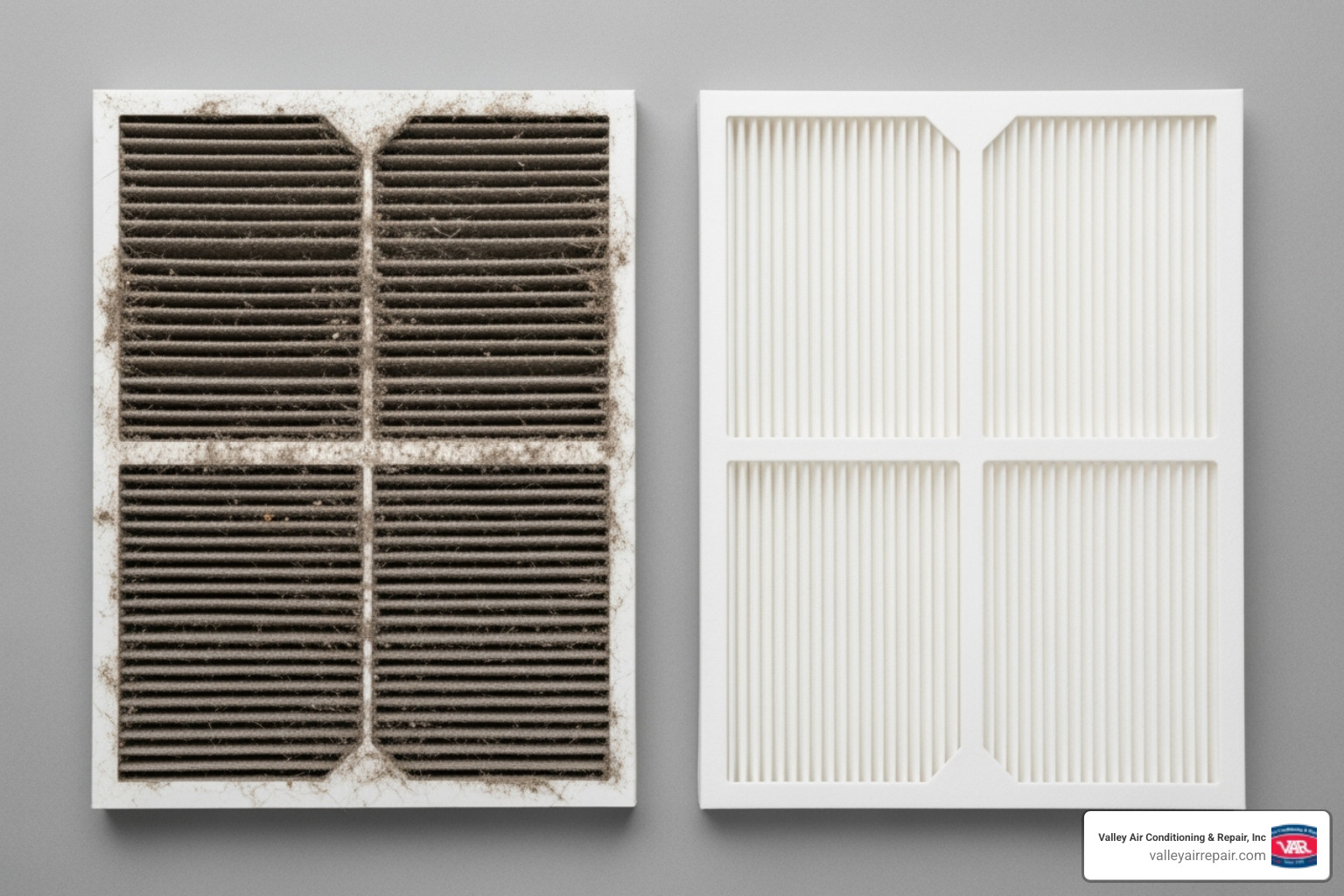
Your air filter has one job: catch dust, pet hair, pollen, and other particles before they gum up your system. But when that filter gets packed with debris, it creates restricted airflow over your evaporator coil. Without enough warm air flowing across it, the coil gets too cold – cold enough to freeze the moisture right out of the air.
Evaporator coil freezing creates a double problem. First, your AC can't cool your home effectively because ice acts like insulation around the coil. Second, when that ice eventually melts (either when the system cycles off or the surrounding air warms it), you get a sudden rush of water that can easily overwhelm your drain system.
The ice melting process can dump several gallons of water into your drain pan all at once. Even a perfectly functioning drain system can struggle with this sudden flood, leading to an overwhelmed drain pan and water spilling onto your floors or dripping through your ceiling.
The simple fix? Change your filter regularly. We recommend checking it monthly during heavy-use seasons and replacing it when it looks dirty. It's a small step that prevents big problems.
More info about residential air conditioning services
Damaged Components: Drain Pans and Condensate Pumps
Sometimes the problem isn't a blockage or frozen coils – it's the drainage components themselves that have given up the ghost. After years of faithful service, these parts can fail and create persistent air conditioner leaks.
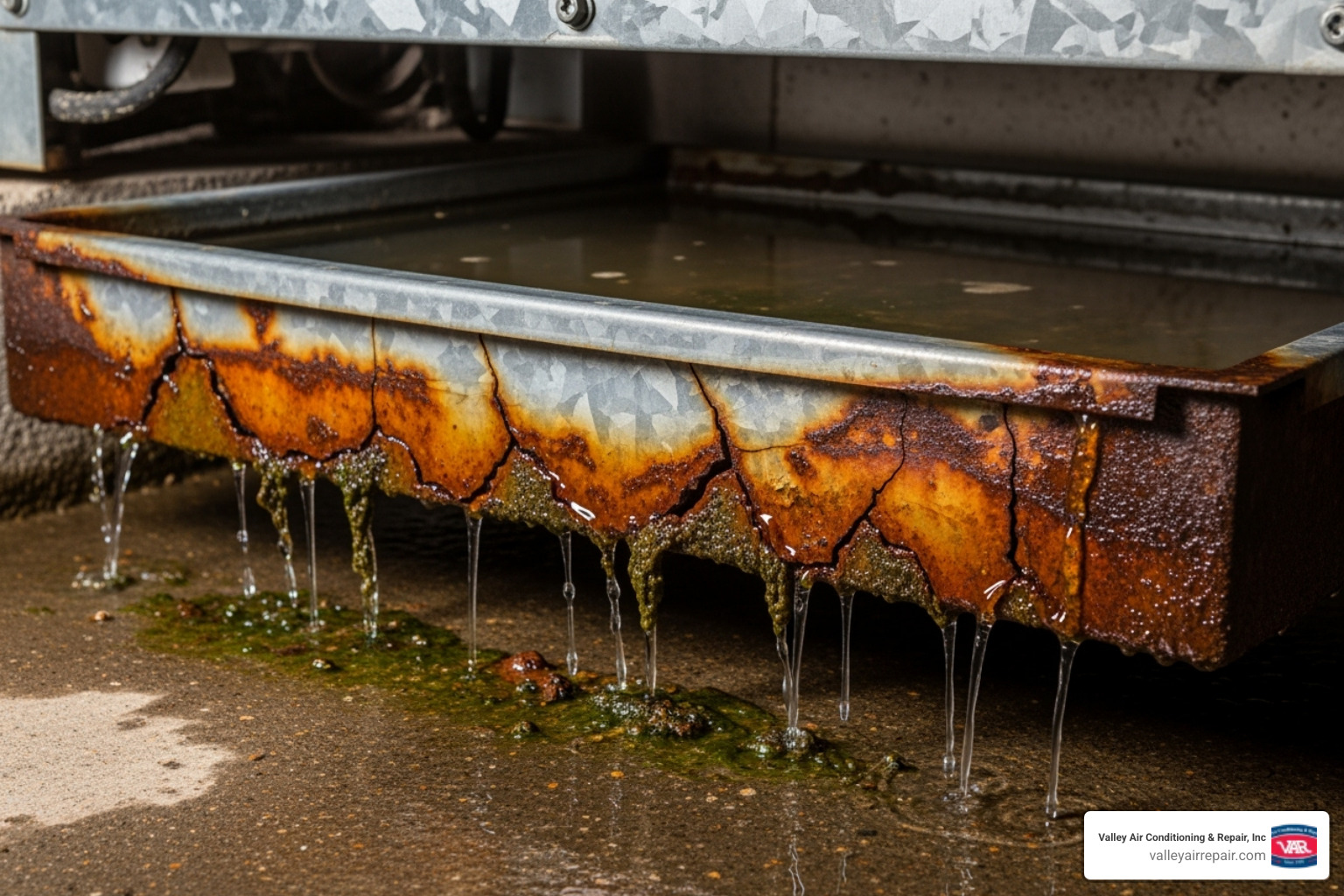
Your rusted drain pan might look fine from above, but underneath could tell a different story. Older systems often have metal drain pans that develop rust spots, cracks, or holes over time. Even a tiny crack means water will leak right through, often going unnoticed until you see stains on your ceiling or smell that telltale musty odor of hidden water damage.
A cracked drain pan doesn't always fail dramatically – sometimes it's just a hairline crack that lets water seep through slowly. These subtle leaks can be particularly troublesome because they cause ongoing damage without obvious symptoms.
Then there's the condensate pump failure scenario. If your indoor unit is located where gravity can't naturally drain the condensation (like in a basement or certain attic installations), you rely on a small pump to move that water uphill or across distances to reach a proper drain.
When these pumps fail – whether from mechanical wear, electrical issues, or simple old age – you face gravity drainage issues that can quickly turn serious. Without the pump working, water backs up and has nowhere to go but out of your system and into your home.
We've seen condensate pumps fail suddenly after years of reliable service, turning a minor maintenance issue into an emergency repair situation. The key is catching these problems early through regular maintenance checks.
More info about AC repair services in Sanger
Your First Response: A Homeowner's Guide to Basic Troubleshooting
So you've finded an air conditioner leak and your heart just sank a little. Take a deep breath – you're not automatically looking at a massive repair bill. Many water leaks have surprisingly simple causes, and there are several safe steps you can take right now that might solve the problem entirely.
Safety comes first, always. Before you do anything else, turn off your AC system completely. Head to your thermostat and switch it off, then go to your electrical panel and flip the circuit breaker that controls your AC unit. This protects you from electrical hazards, prevents further water damage, and stops the problem from getting worse while you investigate.
Now that the power's off, let's play detective. Start with your air filter – it's the most common culprit we see. Pull it out and take a good look. If it's gray with dust or clogged with pet hair, you've likely found your problem. When filters get this dirty, they restrict airflow so much that your evaporator coil freezes up. Later, when all that ice melts, it creates more water than your drain system can handle.
Next, check your drain pan. This is the tray sitting beneath your indoor unit's evaporator coil. If you see standing water or signs of overflow, you've found where the leak is coming from. Look closely at the pan itself – any cracks, rust spots, or obvious damage? Even a small crack can cause a big mess over time.
The condensate drain line is your next target. If the drain pan is overflowing but looks fine, you're probably dealing with a clog. Find where your drain line exits your home (usually a PVC pipe near your outdoor unit). Here's a handy trick: grab a wet/dry vacuum and create a tight seal over the end of that pipe. Let it run for a few minutes – the suction often pulls out whatever's blocking the flow.
You can also try a gentle cleaning approach. Look for a T-shaped vent near your indoor unit (that's the drain line access point) and pour in a mixture of equal parts distilled white vinegar and water. Let it sit for about thirty minutes to kill any mold or algae buildup, then flush it through with clean water.
Finally, check if your unit is sitting level. While this isn't common with established systems, sometimes settling or improper installation means water doesn't flow properly into the drain pan. Use a spirit level on your indoor unit – if it's tilted, that could be your problem.
After you've tried these steps, turn your system back on and keep an eye on things. If the leak stops, congratulations! You just saved yourself a service call. But if water keeps appearing, or if you noticed any signs of refrigerant issues earlier, it's time to call in professional help. Some problems need specialized tools and expertise to fix safely and permanently.
Red Flags: When an AC Leak Demands Professional Attention
Sometimes you can roll up your sleeves and tackle an air conditioner leak yourself. But other times? Well, that's when you need to step back and call in the professionals. Trust us – we've seen what happens when homeowners try to fix everything themselves, and it's not always pretty.
Signs of a refrigerant leak are your biggest red flag. Remember those telltale signs we talked about earlier? The hissing sounds, that weird sweet chemical smell, oily residue around your AC lines, or your system blowing warm air while working overtime? These aren't DIY territory. Refrigerants are genuinely hazardous chemicals that require special handling, and only certified technicians have the proper equipment to safely detect, repair, and recharge your system. We're talking about your family's safety here – it's worth the professional call.
Significant water damage means the situation has already escalated beyond a simple fix. When you're seeing water stains creeping across your ceiling like a slow-motion disaster movie, or water actively pooling on your floors, that leak has been working overtime. Prolonged water exposure doesn't just damage paint – it can compromise your home's structure, warp flooring, and turn into a major renovation project. The sooner we can stop the source, the less damage you'll face.
Electrical hazards are an absolute emergency. Water and electricity make terrible roommates, and if you spot water near electrical components, hear buzzing sounds, or catch a whiff of something burning, it's time to flip that breaker and step away from the unit entirely. This isn't about comfort anymore – it's about preventing electrical shocks or house fires. No AC repair is worth risking your safety.
Persistent leaks after troubleshooting tell us there's something deeper going on. You've been a responsible homeowner – you changed that filter, cleared the drain line, checked the pan – but that stubborn leak just won't quit. This usually means the problem is hiding somewhere you can't easily see or reach. Maybe it's a damaged evaporator coil, a failing condensate pump, or a complex blockage deep in the system. Our technicians come armed with diagnostic tools that can pinpoint these sneaky issues.
Mold growth health risks turn a simple leak into a health concern. That strong musty smell isn't just unpleasant – it's often your first warning that mold is setting up shop in your home. And let's be honest, nobody wants to deal with moldy carpets or contaminated air. Mold can trigger allergies, worsen respiratory issues, and spread throughout your home's structure if left unchecked. Professional remediation ensures both the leak and the health hazard get properly addressed.
Here's the thing about air conditioner leaks – they're rarely just about water dripping where it shouldn't. They're symptoms of something happening within your system, and catching these problems early with professional help can save you from much bigger headaches down the road.
More info about AC repair services in Fresno
Why is my AC leaking water in Fresno?
Frequently Asked Questions about Air Conditioner Leaks
Over our decades of serving Valley homeowners, we've heard just about every question imaginable about air conditioner leaks. Here are the ones that come up most often during our service calls – and the honest answers we give every homeowner.
Can I still use my AC if it's leaking water?
We get this question a lot, usually from homeowners standing in flip-flops next to a growing puddle, desperately hoping we'll say "yes" because it's 105°F outside. But here's the truth: No, you should turn it off immediately.
We know it's the last thing you want to hear on a scorching Valley day, but running a leaking AC is like ignoring a small kitchen fire because you're not done cooking dinner. That little drip might seem harmless, but it can quickly turn into a major water damage situation. We've seen homeowners lose hardwood floors, ruin drywall, and even damage the structural integrity of their homes because they kept running a leaking unit "just until the repair guy arrives."
There's also the electrical hazard to consider. Water and electricity make for a dangerous combination that can lead to shorts, damaged components, or worse. Plus, continuing to run the system often makes the underlying problem worse, turning what might have been a simple drain line cleaning into a much more expensive repair.
Trust us – a few uncomfortable hours are better than thousands of dollars in water damage repairs.
How much does it cost to fix a leaking AC?
This is probably the second most common question we hear, right after "Can I keep using it?" The honest answer is that repair costs vary significantly depending on what's causing your air conditioner leak.
If you're dealing with a clogged drain line – the most common culprit – you're looking at a relatively straightforward cleaning service. On the other hand, if your evaporator coil needs replacement, that's a much more involved repair with higher costs for both parts and labor.
Here's what really matters: getting a proper diagnosis first. We've seen too many homeowners try to guess what's wrong and end up spending money on the wrong fixes. A professional diagnosis helps you understand exactly what you're dealing with and ensures you're investing in the right solution.
The other thing to remember is that prompt action saves money. That small leak might seem minor today, but if it's coming from a failing drain pan, waiting could mean water damage to your home's structure. We always tell our customers that addressing AC problems early prevents those expensive surprise bills later.
How can I prevent future AC water leaks?
Now this is our favorite question! Prevention is so much easier (and cheaper) than emergency repairs, especially when you're dealing with air conditioner leaks. The good news is that most leaks are completely preventable with some simple maintenance habits.
Regular filter changes are your first line of defense. We recommend checking your filter monthly during peak cooling season. A dirty filter restricts airflow, which leads to frozen coils, which leads to melting ice overwhelming your drain pan. It's like a domino effect that starts with something as simple as forgetting to change a $15 filter.
Annual professional maintenance is worth its weight in gold. During these tune-ups, our technicians clean your condensate drain line, inspect your drain pan for damage, check refrigerant levels, and catch small problems before they become big leaks. We've been doing this since 1970, and we can tell you that customers who invest in regular maintenance rarely call us for emergency leak repairs.
You can also help by keeping your outdoor unit clean and free of debris. Leaves, grass clippings, and dirt can eventually make their way into your system and contribute to clogs. A simple monthly hose-down of the outdoor unit goes a long way.
Between professional visits, try flushing your drain line with a vinegar and water mixture every few months. This simple step prevents algae and mold buildup that often causes those frustrating clogs.
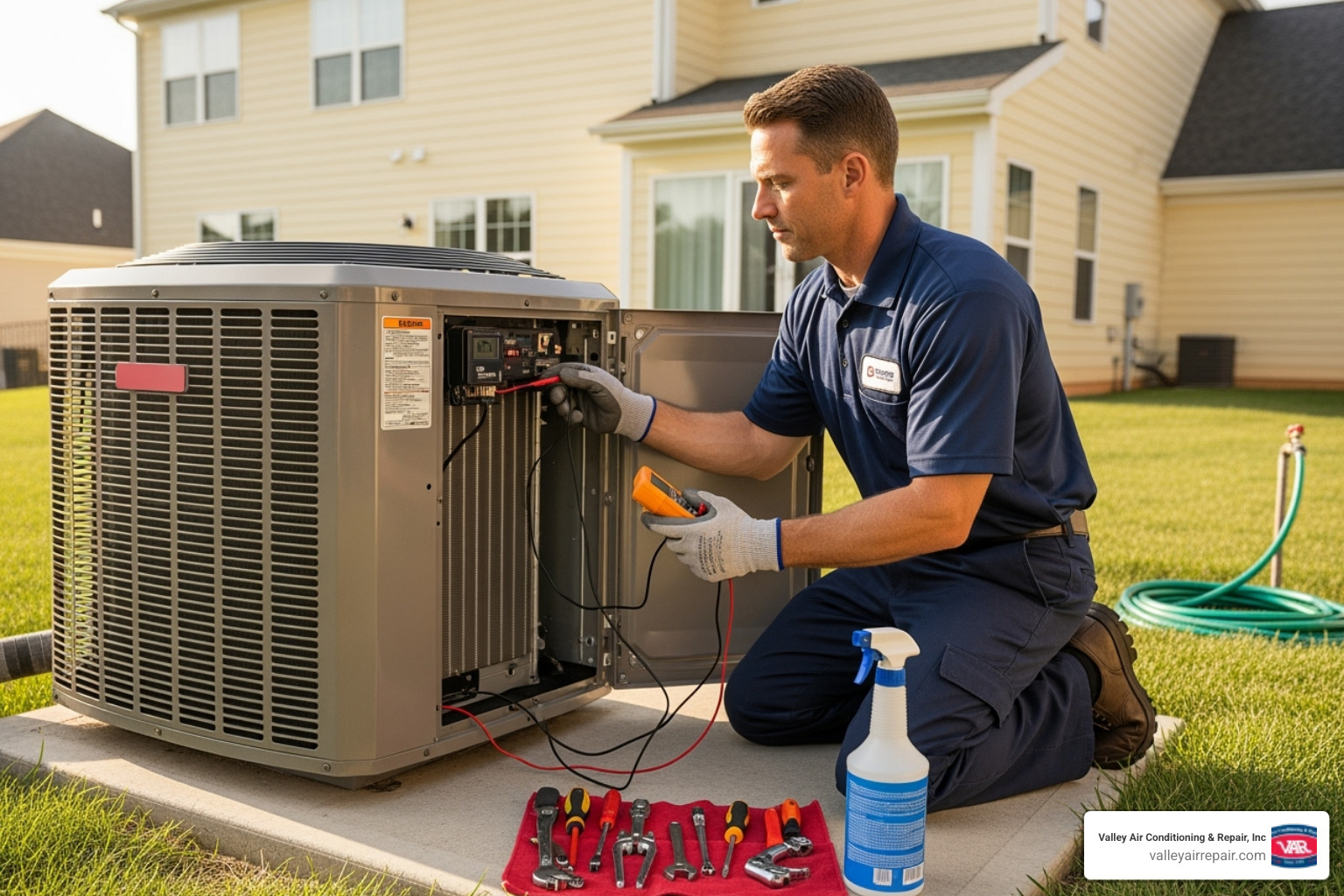
The bottom line? A little preventive care keeps your AC running smoothly and your home dry. Your future self will thank you when you're staying cool and comfortable instead of dealing with emergency repairs during the hottest week of summer.
The importance of maintaining your air conditioner
Stay Cool and Dry with Expert HVAC Help
When air conditioner leaks turn your peaceful home into a water park you never wanted, it's natural to feel overwhelmed. Throughout this guide, we've walked through the most common reasons why your AC might be creating these unwanted indoor water features - from the surprisingly frequent clogged condensate drain lines to dirty air filters that cause frozen coils, and from damaged drain pans to failed condensate pumps that just give up on the job.
The reality is that many of these water leaks don't have to happen in the first place. Regular maintenance really is your best friend here. Something as simple as swapping out your air filter monthly and giving that condensate drain line a good cleaning a few times a year can prevent most of the headaches we've discussed. Think of it like brushing your teeth - a little prevention goes a long way.
But here's where honesty matters: sometimes you need to know when you're in over your head. If you're dealing with a refrigerant leak (remember that sweet chemical smell and oily residue?), significant water damage that's already staining your ceiling, any electrical hazards, or a leak that just won't quit despite your best troubleshooting efforts, it's time to call in reinforcements. These situations aren't just about comfort - they're about safety and protecting your home's value.
Mold growth from persistent leaks isn't just gross; it can seriously impact your family's health. And refrigerant? That's not something you want to mess around with - it requires specialized training and equipment to handle safely.
At Valley Air Conditioning & Repair, Inc., we've been helping Valley families stay cool and dry since 1970. That's over five decades of seeing every kind of AC problem you can imagine, and probably a few you can't. Our approach has always been straightforward: treat every customer like family, give honest advice, and fix things right the first time.
We know how frustrating it can be when your AC starts acting up, especially during those blazing Valley summers. That's why we focus on prompt action to prevent costly damage and get your system back to doing what it does best - keeping you comfortable without any surprise indoor water features.
Don't let a leaking AC turn your day upside down. We're here with the expertise and trust that your neighbors have relied on for generations.




.webp)


